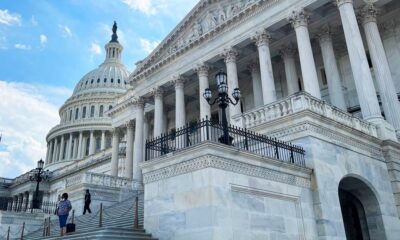Regulation
What Crypto Regulation May Bring in 2024

The CoinDesk policy team is scattered throughout the world; in the final edition of this newsletter, each member explains what they’re watching in 2024 in the world of crypto regulations. Happy holidays, and we’ll see you next year!
You’re reading State of Crypto, a CoinDesk newsletter looking at the intersection of cryptocurrency and government. Click here to sign up for future editions.
As is now this newsletter’s annual tradition, CoinDesk’s regulation team explains what we’re paying attention to in 2024.
Next year will be busy. Crypto is having a resurgent moment, and this past year’s conviction of Sam Bankman-Fried and guilty plea from Changpeng Zhao, the potential approval of a spot bitcoin exchange-traded fund and just a general upswing in the market are sure to have a lot of people feeling hopeful about this industry’s future. But lawmakers and regulators aren’t likely to spend less time on crypto issues either.
Nikhilesh De: There’s no rest for the weary. Though a lot happened in 2023, including an entire criminal trial, next year promises to be much busier. I’m interested in five main categories of events or activities that may play out next year: Court cases, elections, regulatory agency actions, legislation and the broader crypto market.
Obviously the U.S. Securities and Exchange Commission has had a pretty active year, with lawsuits against Coinbase, Kraken and Binance/Binance.US over the past 12 months (really the past seven). While the regulator’s case against Ripple shows us that it may take a while for these cases to resolve, we’ll still start seeing how the courts view the arguments being made.
The Commodity Futures Trading Commission will likewise have an interesting role next year. CFTC Chair Rostin Behnam has said on a number of public occasions that he’s proud of how many enforcement actions his agency’s taken, and that’s not likely to let up next year.
Beyond that, there’s also the national security and criminal cases. USA v. Avi Eisenberg, Roman Storm, Alex Mashinsky, Changpeng Zhao and even Samuel Bankman-Fried (round 2) will see federal prosecutors raise some interesting legal questions for the crypto industry.
Bankman-Fried and Zhao both have sentencing hearings coming up in the first half of the new year. Zhao is looking at 10-18 months or so when he’s sentenced in late February 2024 after pleading guilty to one charge of violating the Bank Secrecy Act as the former CEO of Binance.
Bankman-Fried, of course, faces a much longer sentence after a jury convicted him on seven different charges in early November. He also faces a potential second trial. We may not know for a few more months whether the DOJ intends to proceed on the second trial, which is currently scheduled to begin in early March. If prosecutors move forward, Bankman-Fried’s sentencing, currently set for later in March, will probably be delayed.
The Eisenberg and Storm cases will be more interesting, just from the legal theories we’re going to see discussed.
Eisenberg, who was arrested a year ago today, is accused of commodities manipulation and fraud after executing a “trading strategy” that resulted in Mango Markets losing $114 million. His trial is currently scheduled for April.
Storm, meanwhile, faces charges of conspiracy to operate a money transmitter, facilitate money laundering and sanctions evasion tied to his work as a developer on Tornado Cash, a crypto mixing service.
The bankruptcies are moving closer to resolutions, and we’ll continue watching them to see what exactly these companies’ former users will get back.
We’re going to be watching (and reporting on) elections in the U.S., European Union, India, Indonesia and possibly the UK next year. Each of these elections will be important – even if the winners don’t have explicit positions on cryptocurrency issues, the department or ministry heads they appoint and the laws they push for will obviously have an impact on the crypto sector.
In the U.S., we’re once again looking at elections at every level of government, from state and local issues to the House of Representatives and Senate to the office of the U.S. president. Campaign season is already in full swing, but within the next few weeks we’ll start to see primary candidates dwindle.
It’s still not clear to me that crypto will really be an issue for lawmakers in the U.S. beyond being generic talking points but we’ll see.
No major crypto legislation advanced out of Congress this year, though stablecoin and market structure bills made more progress than any previous legislation. We’ll likely see these bills continue to be discussed this upcoming year, though of course the election will be a major wrinkle.
The people to watch are Congressman Patrick McHenry (R-N.C.), the House Financial Services Chair who’s not running for reelection; Congresswoman Maxine Waters (D-Calif.), the House Financial Services Ranking Member; Senator Sherrod Brown (D-Ohio) the Senate Banking Committee Chair, who is running for reelection; and Senator Tim Scott (R-S.C.), who briefly ran for president.
McHenry has already told Politico he intends to push forward with crypto legislation during his final term. Still, he’s up against a clock: At some point, Congress is going to be more focused on elections and campaigning than on their work in D.C.
Similarly, we’ll see if federal regulators engage in further rulemaking, as well as which outstanding proposed rules they adopt.
Of course, we can’t ignore the fact that prices are up, people are booking paper returns (and some actual returns) and that there’s a lot of excitement around. Whether things are different this time in terms of resilient platforms or market structures, and whether people are better protected against losing billions of dollars, will both affect how regulators worldwide look at this industry.
This time last year, I predicted that questions about user data on bankrupt platforms will get more airtime; that the SEC would take more actions, that I wouldn’t expect much in terms of legislation and that regulators would have a reaction to 2022’s collapse. I think some of these predictions held up pretty well: The SEC sued a number of exchanges and legislation advanced out of committee but has yet to clear any major body of Congress. I don’t think enough time has passed for us to clearly see the regulatory response to the collapse of FTX and other companies, but lawmakers are clearly thinking about these issues.
Sandali Handagama (EMEA): In my heads-up for 2023, I said we’d hear quite a bit about global norms for crypto. Well, the watchdogs really came through – and with gusto.
Case in point: crypto’s theoretically less volatile subset, stablecoins, are getting some global-level tough love. International securities regulator IOSCO in its policy recommendations rejected industry pleas for stablecoins to receive special treatment. Banking regulator BCBS followed that up with plans to tighten requirements for stablecoins to qualify as safer assets for bank exposures. We’ll see a lot more tweaking or introducing of new standards for crypto and stablecoins next year.
If 2023 was the year of crypto regulation, 2024 will see some of those rules in action. The European Union’s landmark Markets in Crypto Assets (MiCA) regulation is set to come into effect next December after its finalization this year. In 2024, companies and EU member states will race to become MiCA compliant. As my former colleague Jack Schickler predicted, companies have indeed been playing some hopscotch, trying to pick the best EU country to settle down in time for the rules.
I’ll also be watching the EU’s parliamentary elections in 2024. Although MiCA’s through, there are plenty more relevant frameworks in the making, including one for the metaverse and another for a digital euro.
We’ll get a better feel for fresh 2023 regulatory regimes in aspiring crypto hubs Dubai and Hong Kong. We’re also expecting more legislation from several jurisdictions including Turkey and South Korea.
Let’s just say that, going into a new year and a new bull run, regulators worldwide have tried to make sure to be in a better position to tell crypto how to stay in line. But my most confident prediction is that campaigning by central banks and standard-setters to convince the masses that central bank digital currencies (CBDC) are better for payments than private crypto will continue into next year. Safe bet.
Jesse Hamilton (U.S.): From the vantage point of Washington, D.C., my predictions for crypto’s 2024 will be wholly unsatisfying for those eagerly awaiting progress.
The best the industry can likely expect is some resolution in its court clashes with the Securities and Exchange Commission (SEC), though the agency is probably going to hammer the sector with targeted new policy. We also have a strong chance of seeing a crypto legislation surge set a new high-water mark in 2024, with passage in the House of Representatives of some digital assets regulation.
Take my predictions this year with some caution, though, because last year I’d suggested the “future could be decided” in 2023 on whether crypto could move forward in the U.S. as a widespread, commonly exchanged asset. In fact, nothing much was decided — except that the SEC isn’t always right, according to federal judges in multiple cases.
Though I’d predicted that Congress would probably take months to “find common ground on crypto,” that ground was never located on the Senate side. A prediction about 2023 would have been better to have read: Expect policy chaos, legal clashes, massive enforcement actions and a small amount of legislative progress.
While an outgoing Rep. Patrick McHenry (R-N.C.), the chairman of the House Financial Services Committee, may find a way to set his crypto legacy by winning House passage for crypto stablecoin regulation, the Senate has been reluctant about doing business on digital assets bills. Anybody who can see into the heart of Sen. Sherrod Brown (D-Ohio), the chairman of the Senate Banking Committee, and read his crypto intentions, please let me know.
While sideshows like the central bank digital currency (CBDC) debate continue, the most impactful policy moves from the U.S. government could be in finalization of truly consequential rules from the SEC and the Internal Revenue Services that would specifically regulate aspects of the U.S. industry for the first time. More than one of these initiatives spell devastation for decentralized finance (DeFi) if they emerge as they were proposed.
As 2024 looms, the industry is finding it more pleasant to focus on the likelihood of a spot bitcoin exchange-traded fund (ETF) getting an SEC nod. But the SEC has multiple crypto rules loosely targeted for April, according to its agenda, including one that would expand the definition of exchanges to include crypto platforms and another that would order investment advisers to keep their customers’ crypto assets with “qualified custodians” — not the current range of industry exchanges, according to SEC chief Gary Gensler. (Though these rules could eventually be challenged in court, just like everything else.)
The takeaway: If you enjoyed 2023 (sicko!), you’ll probably really like 2024.
Amitoj Singh (India): The world’s largest democracy goes to elections next year and by June 2024, based on current state election trends and polls, Narendra Modi will return as India’s Prime Minister for a third term. With it, the same policies represented by his party, the Bharatiya Janta Party, are likely to be retained. That would mean India’s controversial and stiff crypto taxation policy may not see a change in 2024. A think tank study supports reducing the taxes – a 30% tax on crypto profits and a 1% tax deducted at source (TDS) on all transactions. The crypto industry has advocated for changes too. But Modi’s government hasn’t given any indication of wanting to change that policy. As for a crypto or Web3-specific legislative bill, Jayant Sinha, one of India’s senior lawmakers from Modi’s party overseeing the financial evolution of the nation, has already said that won’t happen anytime soon and perhaps not until mid-2025. As a result, in 2024, India’s crypto enthusiasts may not have much hope for a reduction in taxation policies, but they will be looking out for piecemeal measures for the Web3 and blockchain industry to be folded into the nation’s further push toward digitizing its future. Modi’s government has already made encouraging steps for the space while maintaining a separate stiff policy for crypto assets. I’ll be keeping an eye on two separate budget presentations in India’s parliament, one before the election and one after, to see if India’s prioritization of framing a crypto framework for the globe as the president of the Group of 20 (G20) nations in 2023, becomes its own domestic legislative priority. As suggested in 2022, I watched the Modi government’s budget presentations in 2023 and its G20 work closely. I also watched whether the Indian central bank’s hopes to launch a full-scale central bank digital currency (CBDC) would come true. They didn’t. However, wholesale and retail pilots have shown promising results and their progress, including concerns around privacy, maybe the focus of 2024.
Camomile Shumba (UK): Last year I said that the U.K. government needed to provide more clarity on how it wants to regulate crypto. Now a year on I can say that the government’s vision for the burgeoning sector has become clearer.
A lot of legislation has passed, meaning the U.K. is moving forward with its plans to be a crypto hub – a desire that according to the U.K. government comes hand in hand with regulation.
The Financial Services and Markets Act (FSMA) – which gave regulators more power over the crypto sector – passed into law in June along with a crime bill that will help law enforcement agencies seize crypto.
The FCA enforced its promotions rules for crypto – which meant that overseas firms could not reach out to U.K. clients without the FCA’s greenlight but this led to crypto firms leaving the country. Firms will be looking to adapt to these rules.
The U.K. will continue to struggle with managing its crypto hub ambition with the FCA’s tendency to be strict. Plus, the U.K.’s staged approach where it deals with one aspect of crypto at a time means that different aspects of the crypto market will be left in limbo until regulations come out. The digital pound consultation results are still yet to come out.
With the election likely to occur next year – and Labour being a popular candidate – another question on everyone’s lips is – if Labour were to take over – what would they change?
Elizabeth Napolitano (U.S.): The cryptocurrency industry has a busy (and seemingly brighter) year ahead of it. Shortly after ringing in 2024, we can expect to see the SEC approve its first swath of spot bitcoin ETFs, which could impel institutional investors to pour big bucks into the digital assets space. News of the approvals may also stir up public interest in virtual tokens, pushing them further from the fringes of finance to center stage.
Across the Atlantic, next year will also prove an exciting one for crypto. In late 2024, we’ll finally see MiCA, the European Union’s (EU) regulatory framework for crypto, take effect. The legislation effectively bans algorithmic stablecoins (think: DAI), which are often used as collateral for borrowing and lending across decentralized exchanges (DEXs) such as Curve Finance and Uniswap. This facet of the framework will likely have second-order effects on the growth of decentralized finance (DeFi) across the EU’s 27 member states, stymieing Europeans’ engagement in a vastly profitable, if perilous, sector of the crypto industry.
Editor’s note: Are you looking out for something specific next year at the intersection of regulations, politics and crypto? Shoot me a note with your name or handle and interest in the space and your note may appear in a future edition of State of Crypto.
If you’ve got thoughts or questions on what I should discuss next week or any other feedback you’d like to share, feel free to email me at nik@coindesk.com or find me on Twitter @nikhileshde.
You can also join the group conversation on Telegram.
Regulation
South Korea Moves to Delay Cryptocurrency Tax Until 2028 Amid Market Concerns

South Korean lawmakers have proposed a bill to delay the tax on cryptocurrency earnings until 2028.
The ruling political party proposed the bill on July 12, citing current negative sentiment around the cryptocurrency sector as the reason for the extension. declared:
“With investor sentiment toward virtual assets deteriorating, some argue that hasty taxation of virtual assets is not desirable at this time, as virtual assets are high-risk assets with a higher risk of loss than stocks, and if income tax were also imposed, it is expected that most investors would abandon the market.”
South Korea had originally planned to implement its cryptocurrency earnings tax on January 1, 2025. However, if the new bill is passed, the implementation date will be moved to January 1, 2028. The subcommittee met on July 15 to continue the review.
The move is in line with President Yoon Suk-yeol’s campaign promisesHe assured voters that he would extend the cryptocurrency earnings tax during the last general election if elected. His administration aims to create a clear regulatory framework before implementing the tax.
However, the Ministry of Economy and Finance has not yet decided on the postponement. The ministry plans to announce new amendments to the fiscal policy by the end of the month.
“No decision has been made on further postponing the implementation of taxation of income from virtual activities,” a ministry spokesperson said. She said.
South Korea’s Thriving Cryptocurrency Industry
South Korea is one of the fastest-growing countries in the world in adopting this emerging sector.
In the first quarter of this year, blockchain platform Kaiko reported that the Asian country’s national currency, the Won, emerged as the leading currency for global cryptocurrency trading, with a cumulative trading volume of $456 billion across centralized exchanges.
Furthermore, the Asian country is a shining light for its proactivity approach to cryptocurrency regulationSouth Korea has implemented different rules designed to improve consumer protection standards for cryptocurrency users in its jurisdiction.
Latest stories from South Korea
Regulation
ESAs consult on guidelines for cryptocurrency regulation

THE European Supervisory Authoritiesincluding EBA, EIPA and ESMA, have published a consultation paper on guidelines under the Markets in Cryptocurrencies Regulation (MiCAR).
In doing so, the ESAs intended to develop templates for legal explanations and opinions regarding the classification of cryptocurrencies along with a standardized assessment to support a common approach to classification. In addition, the current move is intended to assist market participants and supervisors in accommodating a standardized test while receiving legal explanations and opinions that provide descriptions of the regulatory classification of cryptocurrencies in different cases. Among them, the ESAs mention:
-
Asset-Referenced Tokens (ART), whose white paper for their issuance must be accompanied by a legal opinion that highlights the classification of the crypto-asset, especially with regard to the fact that it is not an electronic money token (EMT) or a crypto-asset that could be excluded from the scope of MiCAR;
-
Cryptocurrencies that are not considered ART or EMT under the Regulation, for which the white paper must be accompanied by an explanation of the classification of the cryptocurrency, in particular information that is not an EMT, ART or a cryptocurrency are excluded from the scope of MiCAR.
As part of the press release, the ESAs mention that the consultation paper can be submitted directly from the consultation page, with a deadline for submissions of 12 October 2024. After holding a virtual public hearing on the consultation paper on 23 September 2023, the authorities are ready to publish all contributions, unless otherwise requested.
Background
In an effort to establish a framework for the provision of crypto-asset services, MiCAR develops regimes to regulate the issuance, supply to the public and admission to trading of EMT, ART and other crypto-assets. The draft was created under Article 97(1) of MiCAR, which requires authorities to jointly provide by 30 December 2024 the Guidelines pursuant to Article 16 of the ESA Regulations (EU Regulation) No. 1093/2010 Regulation 1094/2010, Regulation 1095/2010) to specify the content and form of the explanation accompanying the white paper on crypto-assets referred to in Article 8(4) and the legal opinions on the qualification of asset-referenced tokens (ARTs) referred to in Article 17(1), point (b)(ii) and Article 18(2), point (e) of MiCAR.
In addition, ESAs are required to include in the Guidelines a model for explanation and opinion and a standardized test for the classification of cryptocurrencies. At the time of the announcement, this was the only joint policy mandate of ESAs developed under MiCAR.
Regulation
Cryptocurrency News Today – July 15, 2024

Welcome to “Crypto News Today”, your daily digest of the cryptocurrency industry.
Bitcoin ETFs surge amid price recovery, market fluctuations
Bitcoin ETFs have seen their best weekly inflows since May, with $882 million in the week ending July 11. Bitcoin’s price has recovered to around $62,000, up 15% from its recent low, reflecting renewed investor interest and market optimism. To learn more, visit the TDR website!
Bitcoin Surpasses Leveraged ETFs
Bitcoin’s price has outperformed risky leveraged ETFs like BITX and BITU, demonstrating the cryptocurrency’s relative stability in a volatile market. Investors are increasingly favoring direct Bitcoin holdings over complex financial products.
SEC Closes Investigation into Hiro Systems
The SEC has concluded its three-year investigation into Stacks developer Hiro Systems without taking any enforcement action. The move brings relief to the company and its shareholders, potentially increasing confidence in the Stacks ecosystem.
Genesis Transfers 760 Million BTC to Coinbase
Amid a market sell-off, Genesis advanced $760 million in Bitcoin to Coinbase. The large transfer has raised speculation about potential trading strategies or liquidity by the digital asset company.
JP Morgan-Backed Partior Closes $60M Series B
JP Morgan-backed blockchain firm Partior has successfully closed a $60 million Series B funding round. The funds will support Partior’s mission to simplify cross-border payments and advance blockchain-based financial solutions.
Cryptocurrencies Become The Theme of 2024
Cryptocurrencies have emerged as a key issue in the 2024 political landscape, with parties and candidates debating regulation, innovation, and the future of digital currencies. This trend underscores the growing importance of cryptocurrencies in economic and political discussions.
Read more cryptocurrency news on the TDR website!
Regulation
How Cryptocurrency Firms Are Capitalizing on MiCA’s Bumpy Launch – DL News

- The MiCA licensing regime will come into force at the end of December.
- Levels of severity vary from country to country.
- This will create opportunities for companies to engage.
Stablecoin laws have already come into force, but EU countries are rushing to comply with the rest of the Union’s new cryptocurrency regulation before the deadline.
The EU regulatory framework requires cryptocurrency businesses such as exchanges to choose a country in which to apply for a license. In practice, countries will inevitably have different levels of stringency.
The Markets in Crypto-Assets regulation is designed to introduce a level playing field across the EU, as national regulators will have to adhere to the same set of standards. Once licensed, crypto-asset service providers, or CASPs, can move their services anywhere in the bloc.
Additionally, countries are allowed to opt for longer transition periods before enforcing the MiCA rules. This is known as the grandfathering period.
All of this could call into question the level of compliance in some countries.
— Ernest Lima, XReg Consulting
That creates opportunities for cryptocurrency firms to seek out jurisdictions with lighter rules and less enforcement, said Ernest Lim, a partner at consultancy XReg. DL News.
“Cryptocurrency companies registered or licensed in different EU member states may be subject to different requirements” between January 2025 and July 2026, Lima said.
Due to time and capacity constraints, some local regulators may have difficulty processing applications in time for the deadline, he added.
“Some may not even have sufficient resources to adequately supervise licensed CASPs,” Lima said.
Join the community to receive our latest stories and updates
“All of this could call into question the level of compliance in some countries.”
Companies are already exploiting the patchy way MiCA regulations are enforced in the EU, in a practice known as regulatory arbitrage, Lima said.
Just the beginning
MiCA’s stablecoin laws went into effect on July 1st, marking the start of the launch.
The next stage is the MiCA licensing regime for cryptocurrency businesses, including exchanges, custodians and investment firms, which will come into force on December 30.
Although the new rules will be stricter, CASPs registered in one country will be able to offer their services throughout the EU27 under the MiCA ‘passporting’ provisions.
Some countries with simpler registration requirements already have significant numbers of VASPs on their registers.
Lima said he expects the number of CASPs in Europe to consolidate significantly, especially in those countries.
In countries with more flexible regulators, companies can benefit from a relatively simple registration process to enter Europe.
According to XReg data, for example, Lithuania has 588 VASPs, while Germany has 12.
Transition period
The MiCA safeguard period will also impact where companies apply for licenses, Lima said.
The grandfathering period is a transition starting on December 30, during which companies can switch to the more stringent CASP regime.
Countries can grant cryptocurrency firms up to 18 additional months from December 30, although the EU securities watchdog recommends a 12-month safeguard period.
In assessing how much time to give companies to transition to the CASP regime, countries will have considered “how prepared they are internally to process applications, the gap between MiCA and their current regime, and the number of companies currently registered in their jurisdictions, all of which influence the workload associated with the transition,” Lima said.
Some countries have announced their transition, others have not, he added.
Among those who have announced:
- France will allow a ramp-up period of 18 months. The country already has a regime similar to MiCA in place.
- Many countries, including Ireland, Germany, Spain and Austria, are opting for the recommended 12-month transition.
- Lithuania, which has very lax AML requirements and a large number of registered VASPs, has been at a standstill for five months.
- The Netherlands will implement the MiCA regime on 30 December and is already accepting applications.
Strategie
Lima said that cryptocurrency companies are evaluating different strategies to take advantage of this uneven distribution.
Some companies are aiming to comply as soon as possible, by December 30, which means they will be the first to avail themselves of passporting rights and gain market share in the EU.
“Others are opting to file multiple applications in EU jurisdictions,” he said.
This approach allows a firm to benefit from a transition period in a trusted jurisdiction while working on a MiCA application.
However, he said that time was running out: local regulators were preparing to start the MiCA application process.
“Soon there will be no more time to process new applications.”
Lima said some companies have no intention of ever complying with MiCA.
Instead, they chose to continue working as long as possible before closing their businesses for good.
Contact the author at joanna@dlnews.com.
-

 News1 year ago
News1 year ago“Captain Tsubasa – RIVALS” launches on Oasys Blockchain
-

 Ethereum1 year ago
Ethereum1 year agoComment deux frères auraient dérobé 25 millions de dollars lors d’un braquage d’Ethereum de 12 secondes • The Register
-

 News1 year ago
News1 year agoSolana ranks the fastest blockchain in the world, surpassing Ethereum, Polygon ⋆ ZyCrypto
-

 Videos1 year ago
Videos1 year agoHistoric steps for US cryptocurrencies! With a shocking majority vote!🚨
-

 Videos1 year ago
Videos1 year agoIs Emorya the next gem💎 of this Bitcoin bull run?
-

 News1 year ago
News1 year agoSolana Surpasses Ethereum and Polygon as the Fastest Blockchain ⋆ ZyCrypto
-

 Videos1 year ago
Videos1 year agoNexus Chain – Ethereum L2 with the GREATEST Potential?
-

 Ethereum1 year ago
Ethereum1 year agoScaling Ethereum with L2s damaged its Tokenomics. Is it possible to repair it?
-

 News1 year ago
News1 year agoFnality, HQLAᵡ aims to launch blockchain intraday repositories this year – Ledger Insights
-

 Regulation1 year ago
Regulation1 year agoFinancial Intelligence Unit imposes ₹18.82 crore fine on cryptocurrency exchange Binance for violating anti-money laundering norms
-

 Bitcoin1 year ago
Bitcoin1 year agoBitcoin Drops to $60K, Threatening to Derail Prices of Ether, Solana, XRP, Dogecoin, and Shiba Inu ⋆ ZyCrypto
-

 News1 year ago
News1 year agoSendBlocks Debuts with Major Support to Improve Blockchain Data Management




















